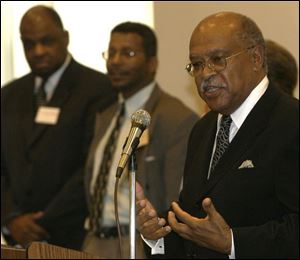
Equal education called unfulfilled
5/13/2004
Virgis Colbert addresses the 1954 U.S. Supreme Court 'Brown vs. Board of Education' decision with Toledo Public Schools Superintendent Eugene Sanders, left, and Dr. Carter Wilson.
Brown vs. Board of Education, one of the best-known Supreme Court decisions in history, eliminated segregation in public schools.
But many are still waiting for equality in the form of a quality education, speakers said yesterday during a program recognizing the 50th anniversary of the landmark case.
Toledo native Virgis Colbert, executive vice president of Miller Brewing Co., and Dr. Carter Wilson of the University of Toledo highlighted the program attended by city and school officials and about 100 students. The program, put on by the city and its Board of Community Relations at the Main Toledo-Lucas County Public Library in downtown Toledo, emphasized the importance of the Supreme Court decision that struck down the "Separate, but Equal" doctrine in public schools.
Mr. Colbert, who runs the worldwide operations for the Miller Brewing, said the Brown case affected his life. He said his father, Quillie Colbert, left school to help on the family farm because schooling
and segregation at the time gave African Americans little hope.
Quillie Colbert moved his 10 children to Toledo for a factory job, and Mr. Colbert said his father's hard work allowed him to attend college and work at Chrysler Corp. before joining Miller in 1979.
Mr. Colbert, named one of the nation's top 50 most powerful black executives by FORTUNE magazine in 2002, said he reminds people about the responsibility for each generation to make things better for the generation following it.
"I take great pride in what previous generations did for us," Mr. Colbert said. He said he credits the "courage, resolve, and personal discipline" of the leaders of that era to help change political policies to where it was more fair to African Americans.
He said the efforts behind Brown vs. Board have allowed his daughter, Jillian, to attend a private school and have a choice of attending top universities. Mr. Colbert said his daughter attended the private school because it offered more diversity and opportunities than the public school in his area.
Mr. Colbert said that is the unfulfilled promise of Brown vs. Board, that integration never brought the quality of education many minorities sought.
Dr. Carter said the fight for adequate public education funding remains alive today. He said the Supreme Court actually started to tear away at many of the promises of the Brown case in the late 1970s and 1980s.
He said during the Reagan administration, the Justice Department stopped supporting groups that wanted to diversify and equalize public education and took the side of public school districts that wanted to be released from federal control of busing and desegregation.
Students from Toledo Public Schools, Lourdes College, and Owens Community College who attended the program said the speakers shed new light on the case.
"[It affected] my whole future," said Justin West, a Start High sophomore. "I wouldn't be able to go to college if it wasn't for what happened 50 years ago. I didn't know much about [Brown vs. Board] before today, and now I hope to use what I've heard today to my advantage. I want to become a politician and help change things."
Teresa Pangle, 19, a member of Owens' student government, said she was familiar with some of the Brown case, but Mr. Colbert's recollections brought the history to life for her.
"His personal testimony was inspirational," she said. "He used the term of the Supreme Court, 'with all deliberate speed,' and used it as a positive.'●"
Contact Clyde Hughes at:
chughes@theblade.com
or 419-724-6095.